高一英语必修1 Unit 4 Earthquakes词汇解析辅导.doc
高一(上)英语必修一Unit4 Earthquakes重点单词短语归纳整理
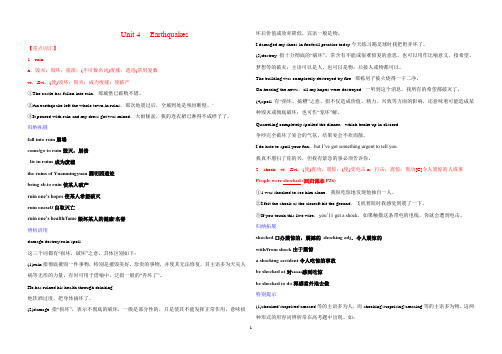
Unit 4 Earthquakes【重点词汇】1 ruinn.毁灭;毁坏;崩溃;(不可数名词)废墟;遗迹(常用复数vt.&vi.(使)毁坏;毁灭;成为废墟;使破产①The castle has fallen into rain.那城堡已破败不堪。
②An earthquake left the whole town in ruins.那次地震过后,全城到处是残垣断壁。
‘③It poured with rain and my dress got/was mined.大雨倾盆,我的连衣裙已淋得不成样子了。
归纳拓展fall into ruin崩塌come/go to ruin毁灭,崩溃lie in ruins成为废墟the ruins of Yuanmingyuan圆明园遗迹bring sb.to ruin使某人破产ruin one’s hopes使某人希望破灭ruin oneself自取灭亡ruin one’s health/fame毁坏某人的健康/名誉辨析活用damage/destroy/ruin/spoil这三个词都有“损坏,破坏”之意,具体区别如下:(1)ruin指彻底摧毁一件事物,特别是摧毁美好、珍贵的事物,并使其无法修复,其主语多为天灾人祸等无形的力量。
有时可用于借喻中,泛指一般的“弄坏了”。
He has ruined his health through drinking.他饮酒过度,把身体搞坏了。
(2)damage指“损坏”,表示不彻底的破坏,一般是部分性的,只是使其不能发挥正常作用,意味损坏后价值或效率降低,宾语一般是物。
I damaged my shoes in football practice today.今天练习踢足球时我把鞋弄坏了。
(3)destroy指十分彻底的“破坏”,常含有不能或很难修复的意思,也可以用作比喻意义,指希望、梦想等的破灭;主语可以是人,也可以是物;后接人或物都可以。
Unit 4 Earthquakes知识点讲解
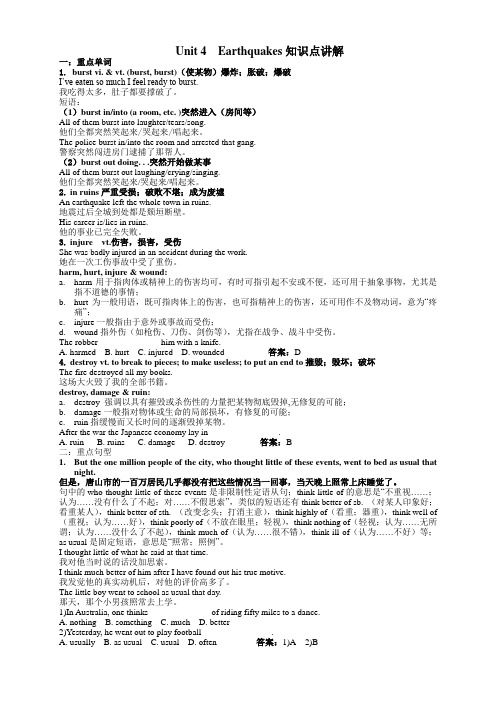
Unit 4Earthquakes知识点讲解一:重点单词1. burst vi. & vt. (burst, burst)(使某物)爆炸;胀破;爆破I’ve eaten so much I feel ready to burst.我吃得太多,肚子都要撑破了。
短语:(1)burst in/into (a room, etc. )突然进入(房间等)All of them burst into laughter/tears/song.他们全都突然笑起来/哭起来/唱起来。
The police burst in/into the room and arrested that gang.警察突然闯进房门逮捕了那帮人。
(2)burst out doing. . .突然开始做某事All of them burst out laughing/crying/singing.他们全都突然笑起来/哭起来/唱起来。
2. in ruins严重受损;破败不堪;成为废墟An earthquake left the whole town in ruins.地震过后全城到处都是颓垣断壁。
His career is/lies in ruins.他的事业已完全失败。
3. injure vt.伤害,损害,受伤She was badly injured in an accident during the work.她在一次工伤事故中受了重伤。
harm, hurt, injure & wound:a.harm用于指肉体或精神上的伤害均可,有时可指引起不安或不便,还可用于抽象事物,尤其是指不道德的事情;b.hurt为一般用语,既可指肉体上的伤害,也可指精神上的伤害,还可用作不及物动词,意为“疼痛”;c.injure一般指由于意外或事故而受伤;d.wound指外伤(如枪伤、刀伤、剑伤等),尤指在战争、战斗中受伤。
The robber______________ him with a knife.A. harmedB. hurtC. injuredD. wounded 答案:D4. destroy vt. to break to pieces; to make useless; to put an end to摧毁;毁坏;破坏The fire destroyed all my books.这场大火毁了我的全部书籍。
重点单词(人教版 必修一 Unit 4 Earthquakes)(讲义)
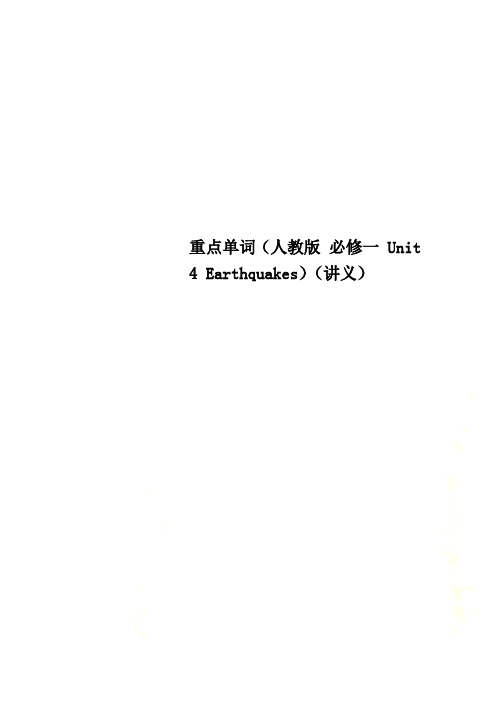
重点单词(人教版必修一 Unit 4 Earthquakes)(讲义)高中英语重点单词(Unit 4 Earthquakes)1. 学习单词,注意重点单词的用法并灵活运用这些单词。
2. 掌握单词的基本用法,辨析各种“伤害”injure/ hurt/ harm/ wound。
重点:burst, injure, shock, rescue, frighten难点:injure的近义词辨析。
【单词学习】1. burst vi. 爆裂,爆发;n. 突然破裂,爆发★★★★burst into突然闯入,突然……起来,后接名词burst into tears/laughter突然哭/笑起来burst into a room(闯)进房间burst out突然开始,后接v.ing形式;(战争、疾病等)突然发生(=break out)burst out crying/laughing突然哭/笑起来burst in突然插嘴,打断谈话;突然来到The dam burst under the weight of water.大坝在水的巨大压力下溃决了。
There was a burst of laughter in the next room. 隔壁房间突然爆发出一阵笑声。
(1)He suddenly _______________________(哭了起来).(2)The audience _______________________________(爆发了一阵欢呼声).injury n.伤害,损伤injured adj.受伤的the injured = the wounded 伤员“the + 形容词”表示一类人,所以谓语动词用复数。
类似短语有许多,例如:the rich 富人;the old 老年人。
injure/ hurt/ harm/ wound这些词都有“伤害,损害”的意思。
(1)injure多指造成容颜、机能的损害;在事故中受伤。
高一英语必修1Unit4Earthquakes词汇解析辅导

高一英语必修 1 Unit 4 Earthquakes词汇分析指导I. Words for reading1. imagine vt. form a picture of in the mind;think of (sth.) as probable:想象;(某事)可能生或存在。
名、代、名、从句。
从句否认意,要用否认移,与 think, believe, suppose, expect 用法同样,成 I/ Wedon’t imagine ⋯, 意“我()⋯⋯不⋯⋯如: Wecan imagine her sadness. 我能够想象她的悲。
I didn ’t imagine (my) becoming a teacher in my childhood. 在童年代,我并未想象能成一名教。
Can you imagine howmuch I was surprised to hear the news?你能想象我听个信息有多惊?I don’t imagine so. = I imagine not.我不是。
imagine, guess, supposeimagine 意“想象,想象”,指在海中形成一个清楚明确的印象,或某事物可能生或存在;guess :form an opinion,give an answer,make a statement,based on supposition,not on careful thought,calculation,or definite knowledge:“猜,臆”,指未知道前的猜 ;suppose: let it be though that; take it as a fact that:定,假设;guess; think:“想象,推”,意指“假设或假中的情况” 。
2. shake, trembleshake: move, be moved,quickly or violently up and down, forwards and backwards:最一般用,可指人或物“ ,抖”。
课本单元讲解:必修一Unit4Earthquakes
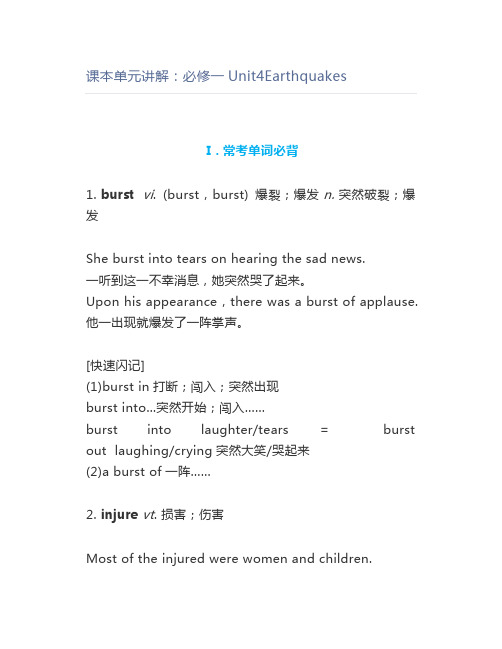
课本单元讲解:必修一Unit4EarthquakesⅠ. 常考单词必背1. burst vi. (burst,burst) 爆裂;爆发n. 突然破裂;爆发She burst into tears on hearing the sad news.一听到这一不幸消息,她突然哭了起来。
Upon his appearance,there was a burst of applause.他一出现就爆发了一阵掌声。
[快速闪记](1)burst in打断;闯入;突然出现burst into...突然开始;闯入……burst into laughter/tears =burst out laughing/crying突然大笑/哭起来(2)a burst of一阵……2. injure vt. 损害;伤害Most of the injured were women and children.大多数伤员都是妇女和儿童。
[快速闪记](1)injured adj.受伤的the injured伤员(2)injury n.伤;伤口;伤害3. shock vt.& vi.(使)震惊;震动n. 休克;打击;震惊I was shocked to hear that he had resigned.听到他辞职的消息我感到很震惊。
The news of my promotion came as a shock.我获晋升的消息着实让我一惊。
[快速闪记](1)be shocked by/at...对……感到震惊be shocked to do...因做……而震惊(2)a shock一件令人震惊的事 (抽象名词具体化用法)(3)shocked adj.感到震惊的shocking adj.令人震惊的4. rescue n.& vt.援救;营救All the people nearby came to her rescue when hearing her cry for help.周围的人们听到她的呼救声都来营救她。
英语必修一Unit 4 Earthquakes词汇句子解析
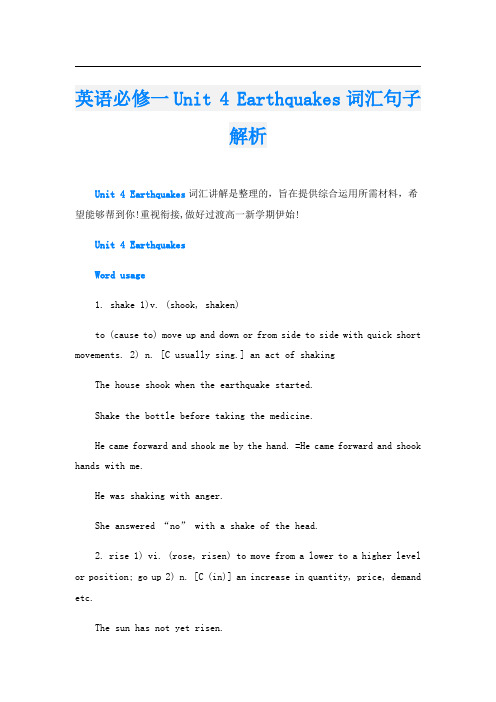
英语必修一Unit 4 Earthquakes词汇句子解析Unit 4 Earthquakes词汇讲解是整理的,旨在提供综合运用所需材料,希望能够帮到你!重视衔接,做好过渡高一新学期伊始!Unit 4 EarthquakesWord usage1. shake 1)v. (shook, shaken)to (cause to) move up and down or from side to side with quick short movements. 2) n. [C usually sing.] an act of shakingThe house shook when the earthquake started.Shake the bottle before taking the medicine.He came forward and shook me by the hand. =He came forward and shook hands with me.He was shaking with anger.She answered “no” with a shake of the head.2. rise 1) vi. (rose, risen) to move from a lower to a higher level or position; go up 2) n. [C (in)] an increase in quantity, price, demand etc.The sun has not yet risen.The population of the city has risen to five million.He rose and left the room.There will be a rise in unemployment next year.Theres been a sharp rise in the cost of living.2. pond n. an area of still water smaller than a lake, especially one that has been artificially madeSome cattle were drinking at the pond.There are some fish living in the pond.When an earthquake is coming, fish will jump out of ponds.3. burst 1) v. to (cause to ) break open or break apart suddenly and violently, usually as a result of pressure from within and often cause the contents to become widely scattered.2) n. an act of result of bursting; (of) a sudden short period of great activity, loud noise, strong feeling; outbreakThe balloon burst.After ten days of rain the river burst its banks.A burst of hand-clapping followed the ending of the song.4. canal n. an artificial stretch of water dug in the ground to allow ships or boats to travel alongit, or to bring water to or remove water from an areaCoal used to be sent here by canal.Canals have been built to irrigate the desert.The Panama Canal joins two oceans.5. steam n. [U] 1) water in the state gas produced by boiling2) power or effort produced by steam under pressure, and used for making things work or moveWho invented the steam engine?Steam was used to be the power of a train.There is steam bursting from that hole.6. ruin 1. n. a) [U] the cause or state of destruction and decayb) [C] a building that has been badly damaged or destroyed2. vt. a) to spoil or completely destroy a person or thingb) to cause someone to loss all their moneyThe temple has fallen into ruin.We visited the ruins of the temple.The heavy rain ruined our holiday.The hurricane ruined all the houses here.The flood ruined the crops.If I lose my lawsuit(官司), the cost will ruin me.7. injure vt. to cause physical harm to (a person or animal), especially in an accident; hurt seriously; to damageI hope I didnt injure her feelings.His back was injured.Two people were killed and seven were injured.His reputation will be badly injured by the vicious rumour.8. destroy vt. to damage sth so severely that it can not be repaired; put an end to the existence of; ruinA fire destroyed the house.What he said destroyed our last hope.All hopes of peaceful settlement were destroyed by his speech.9. brick n. [C,U] 1) a hard piece of baked clay used for building2) sth. in the shape of a brickThey used yellow bricks to build the house.The tower is made of bricks.Bricks covered the ground like red autumn leaves.10. useless adj. not of any useThis knife is so blunt. Its useless.I realized it was useless to reason with him.I was useless at maths. = My maths is very poor.11. shock 1) n. a) [C, U] a violent force from sth such as explosion,a crash or a hard blowb) [C, U] the feeling you get after sth unexpected and usually very unpleasant has suddenly happened, or you have received an unexpected piece of newsc) the poor medical condition of someone who has an accident and whose heart and lungs are not working properly2) v. to make someone feel very upset, angry, or unpleasantEarthquake shocks are often felt in Japan.The news of his death was a shock to us.The traffic accident sent him into a state of shock.They were shocked by her rudeness.We were shocked by his sudden death.12. rescue v. to save someone or sth from harm or dangerHe rescued three children from the burning building.The life boat was sent out to rescue the sailors from the sinking ship.The boy was rescued after hours at sea.13. disaster n. [C,U] a sudden event causes great loss or harmWe were all shocked by the disaster.The earthquake is one of the worst natural disasters the country has ever suffered. People began to wonder how long the disaster would last.14. organize v. to plan and arrange an event; to arrange things ina sensible orderWell organize an oral English contest.The story is very well organized.They organized the truckers into a union.15. shelter 1) n. a) [U] protection, especially from bad weather or danger b) a building that protects you from weather or danger.2) vt. to protect someone or sth from bad weather or danger;vi. to stay in a place in order to be protected from bad weather or dangerThe umbrella is a poor shelter from heavy rain.Their immediate need is for food, clothing and shelter.The wall sheltered us from the wind.She was accused of sheltering a murderer.She wad sheltered by the USA.In the rain people were sheltering in the doorways of shops.16. fresh adj. 1) new and different (only before a noun ); 2) recently picked, caught, produced and therefore in good condition (used of food);3) clean, cool and pleasantThey buy fresh meat.This kind of fish lives in fresh water.She is fresh from university.She is quite fresh to office work.17. percent n. parts for each 100The bank has increased its interest rate by one percent.Over ninety percent of the islanders here are illiterate.He spends a large percent of his income on food and drink.18. speech n. 1) [C] a formal talk to a group of listeners2) [U] the ability to speak or the act of speaking3) [U] way of speakingThe chairman made an opening speech.She is researching speech development in children.We express our thoughts by speech.By your speech I can tell youre from Hong Kong.19. judge 1) vi. vt. to decide who or what is the winner in a competition2) [vt. + that] to form or give an opinion about someone or sth after careful thoughtjudging from, judging by…3) n. a public official who has the power to decide questions brought before a court of law; a person who has the knowledge and experience to give an opinion about the value of sthYou cant judge a book by its cover.He is going to judge the first race.We must judge whether he is guilty.The prisoner was taken before the judge.He was one of the judges at the horse race.20. honour 1) n. a) [U] great respect and admirationb) [sing] sth that brings great respect and pride2) v. to show respect to sb. or to praise sb. publiclyWe fight for the honor of our country.He is an honor to our school.Children should be taught to show honor to their elders.He honors his teachers.20. prepare 1) vt. to make sth. ready for a future event or action 2) vi. to get ready to do sth.They prepared themselves for the worst.When we arrived home, mother had already prepared dinner for us.I was preparing for bed when I heard a knock at the door.Useful expressions1. right awayat once ; in no time; immediatelyI will return the book right away.I am getting in touch with him right away.We are about to start right away.2. end1) at an endfinish; overIt seems that the world was at en end.2) bring… to an end =put an end to…I wonder how I can bring the dispute to an end.=I wonder how I can put an end to the dispute.3) come to an endThe meeting came to an end at midnight.4) at the end of…At the end of the road there is a shop.5) by the end of…How many English words have you learned by the end of last term?6) in the end =at last; finallyHe will be a scientist in the end.3. dig out1) to get sth out of a place, using a spade or your hands2) to find sth you have not seen for a long time, or that is not easy to findLets dig out the roots.Why did you dig out all those old magazines?We must dig the truth out of him.1. a (good \ great \ large) number of+ n.(pl.)many; a large quantity of; a lot ofA good number of students are not interested in modern art.Ive seen the film a number of times.The Great Wall attracts a great number of foreign tourists every day.the number of…The number of private colleges has increased.= Private colleges have increased in number.5.give out1) to give sth to a number of different people, especially to give information to people2) to produce light, heat, a sound, a gas, smell etcYou have no right to give my telephone number out.Students were giving out leaflets(传单)to everyone on the street.The teacher gave out the examination papers.The radiator (散热器) is giving out a lot of heat.与give有关的常用短语还有:give away 送掉,捐赠give in 让步,屈服give off 发出(气味、光、热、声音等),此时相当于give outgive up放弃give back 归还6.thousands of基数词+s,并不表示确切的具体数字,可以单独使用,也可以先接介词of 再接复数名词。
人教版高中英语必修1Unit4Earthquakes(B1)
Unit 4 EarthquakesSection 1 Warming Up, Reading & Comprehending重点知识精讲一、重点单词1. burst(1) vi. (使)爆裂;胀开;突然出现;涨满;爆满That balloon will burst if you blow it up any more. 你再给气球充气,它就要爆了。
He burst into the room without knocking. 他没敲门就闯进了房间。
The roads are bursting with cars. 车辆把道路挤满了。
(2) n. 突然爆裂;爆发;迸发His breath was coming in short bursts. 他呼吸急促。
I tend to work in bursts. 我的工作劲头往往是一阵一阵的。
【知识拓展】be bursting to do sth 急于(或迫切想)做某事burst (sth) open (使)猛然打开burst in 突然打断(插嘴)burst into a room = break into a room 破门而入burst in on sb./ sth. (突然闯进而)打乱;扰乱burst into tears = burst out crying 突然大哭起来burst into laughter = burst out laughing 突然大笑起来burst out (突然)激动地喊叫burst into flames 突然燃烧起来burst on/ onto sb. 突然显现;突然在……出现【注意】burst的过去式和过去分词都是burst。
2. ruin(1) vt. 毁坏;破坏;毁灭;使破产The bad weather ruined our trip. 恶劣的天气破坏了我们的旅行。
If she loses the case it’ll ruin her. 如果败诉,她就完蛋了。
高一必修一第四单元Earthquakes
Starter Unit 4 Earthquakes知识点讲解That| which| who| whose引导的定义从句欣赏谚语:He who knows nothing but pretends to know everything is indeed a good-for -nothing.不懂装懂,一事无成.It's the first step that counts.千里之行,始于足下He who makes himself a sheep shall be eaten by the wolf.甘当小绵羊,迟早要喂狼.He who laughs last laughs best.谁笑在最后,谁笑得最好。
God helps those who help themselves.自助者天助。
定语从句总结及练习I.概念:(1) 定语从句:在主从复合句中用作定语修饰某一名词或代词的从句叫定语从句。
定语从句一般紧接在先行词后面。
(2)先行词:被定语从句修饰的成份。
先行词可以为一个词,短语,或整个主句。
(3)引导定语从句的词叫关系词,分为关系代词和关系副词。
关系词的作用:1)引导定语从句,连接主句和从句,相当于一个连词;2)必在从句中作某个句子成份(关系代词:主语,宾语,表语,定语:关系副词:状语) 常用的关系代词: that、which、who、whom、whose、as、常用的关系副词(在从句中只作状语) :when、why、whereThe student who answered the question was John.I know the reason why he was so angry.The boy (whom) you are talking to is my brother.I'd like a room whose window looks out over the sea.定语从句三步:1.第一找出先行词:2.第二看引导词在定语从句中的语法功能(做主语、宾语或状语) ;如果除引导词外的部分是完整的句子(五种简单句的任何一种及there be句型)就用关系副词:否则用关系代词3.第三选择合适的关系词。
高考英语(人教版)要点梳理 必修1 Unit 4 Earthquakes
必修1Unit 4 Earthquakes●重点单词1.burst vi.爆裂;爆发 n.突然破裂,爆发2.event n.事件;大事3.nation n.民族;国家;国民→national adj.国家的,民族的→nationality n.国籍4.ruin n.废墟;毁灭 vt.毁灭;使破产5.suffering n.苦难;痛苦→suffer v.受苦,遭受6.extreme adj.极度的→extremely adv.7.injure vt.损害;伤害→injured adj.受伤的→injury n.伤害,损害8.destroy vt.破坏;毁坏;消灭9.useless adj.无用的;无效的;无益的→useful(反义词)→use v. & n.使用,利用10.shock vt. & vi.(使)震惊;震动 n.休克;打击;震惊11.rescue n. & vt.援救;营救12.trap vt.使陷入困境 n.陷阱;困境13.electricity n.电;电流;电学→electric adj.用电的;带电的;发电的→electrical adj.与电有关的;电学的14.disaster n.灾难;灾祸15.bury vt.埋葬;掩埋;隐藏16.shelter n.掩蔽;掩蔽处;避身处17.damage n. & vt.损失;损害18.frighten vt.使惊吓;吓唬→frightened adj.受惊的;受恐吓的→frightening adj.令人恐惧的19.judge n.裁判员;法官 vt.断定;判断;判决→judgement n.判断,判决20.express vt.表示;表达n.快车;速递→expression n.表达→expressive adj.有表现力的●重点短语1.right away立刻2.at an end 结束3.in ruins成为废墟4.dig out掘出;发现5.a(great) number of 许多;大量的6.give out分发;发出(气味、热等)7.thousands of成千上万8.think little of 不重视;不假思索9.blow away吹走;刮走10.be proud of以……而自豪11.instead of代替12.be trapped in陷入……之中13.be known for/as因为/作为……出名14.bring in引进;引来●重点句型1.In the farmyards, the chickens and even the pigs were too nervous to eat. 在农家院子里,鸡和猪都烦躁不安,以致不吃食。
高中英语单词精讲第一册Unit4Earthquakes
dam
n水坝,堰堤
略
207
track
n轨道,足迹,痕迹
trac=trag,tract,拖,拉。古法语中trac代表轨迹,车道。而轨迹和车道都是车轮拖动压出来的,最终引申为被车轮或脚压出的痕迹。Tractor
208
useless
adj无用的
ues=使用,用处,less=否定形容词后缀。Useful,careless,careful。Ful=full
n记者
re=向后,往回,port=携带,把消息带回去就是报道,er=人。Portable便携的,
222
bar
n条,棒
略
223
damage
n & vt损失,损害
dam=damn=伤害,age=名词后缀,伤害就会带来损失
224
frighten
vt使惊吓,吓唬
fright=惊恐,en=动词后缀.strengthen
184
well
n井
wel=希望,希翼,引申出了好,wel=转、弯、翻滚,引申水井,源泉
185
crack
n裂缝,噼啪声;v开裂,破裂
拟声词,中文口头语中有一个很近似的拟声词——咔啦。Cracked
186
smelly
adj发臭的,有臭味的
中古英语smellen=闻、嗅,散发气味,smell有味道,闻,臭味等意思,y=形容词后缀,类似的有windy,cloudy。Smelly pest
sincere=源自拉丁语sincerus纯的,不掺假的,ly=副词后缀
230
express
vt表示,表达;n快车,速递
ex=出,press=压,把思想或想法压出来→表达
- 1、下载文档前请自行甄别文档内容的完整性,平台不提供额外的编辑、内容补充、找答案等附加服务。
- 2、"仅部分预览"的文档,不可在线预览部分如存在完整性等问题,可反馈申请退款(可完整预览的文档不适用该条件!)。
- 3、如文档侵犯您的权益,请联系客服反馈,我们会尽快为您处理(人工客服工作时间:9:00-18:30)。
高一英语必修1 Unit 4 Earthquakes词汇解析辅导I. Words for reading1. imagine vt. form a picture of in the mind;think of (sth.) as probable:想象;认为(某事)可能发生或存在。
宾语为名词、代词、动名词、从句。
宾语从句为否定意义时,要用否定转移,与think, believe, suppose, expect用法相同,成为I/ We don’t imagine…,意为“我(们)认为……不……如:We can imagine her sadness.我们可以想象她的悲伤。
I didn’t imagine (my) becoming a teacher in my childhood.在童年时代,我并未想象能成为一名教师。
Can you imagine how much I was surprised to hear the news?你能想象我听见这个消息有多惊讶吗?I don’t imagine so. = I imagine not.我认为不是这样。
imagine, guess, supposeimagine意为“想象,幻想”,指在脑海中形成一个清晰明确的印象,或认为某事物可能发生或存在;guess:form an opinion, give an answer, make a statement, based on supposition, not on careful thought, calculation, or definite knowledge: “猜测,臆测”,指未知道前的猜测;suppose: let it be though that; take it as a fact that:认定,假定;guess; think: “想象,推测”,意指“假定或假设中的情形”。
2. shake, trembleshake: move, be moved, quickly or violently up and down, forwards and backwards: 最普通用词,可指人或物“摇动,发抖”。
指人时常用于感情激动、寒冷、惧怕引起的身体颤动。
在表示“因……而颤抖”时,多用with。
在表示“使受震撼,使(信念等)动摇”,常用于be shaken by/with/at中。
tremble: shake involuntarily ( with fear, anger, cold, physical weakness, etc.) 颤栗,震颤,发抖(因恐惧,愤怒,寒冷,体弱等),常常与shake相互替换,但指握手,摇头或捧腹大笑时用shake, tremble 只用作不及物动词。
如:The poor boy was shaking with cold.这个孩子正冻的发抖。
They were badly shaken by the news.他们对这个消息大为震惊。
The host shook hands with all the guests.主人跟所有的客人握手。
Her voice was trembling with anger.她气的声音发抖。
3. rise, raiserise vi. ( of the sun, moon, stars, river, price, temperature, etc.) appear above the horizon:指自然“上升”,常用于日、月、云、霞、烟、水蒸气、物价、温度、河水、潮水及人的职位等:He rose from his chair and began his speech.他从椅子上站起来开始了他的演说。
Her temperature is still rising.他的体温还在上升。
He has risen in rank.他已经升职了。
raise vt. 1. lift up; move from a low(er) to a high(er) level; cause to rise: 外部的力量,“举起、提高”:The people’s living standard has greatly been raised.人民的生活水平已大大的提高了。
2.grow or produce (crops); breed (sheep, etc.); bring up a family: 饲养、种植”、养育、抚育:They can raise rice here.他们这儿能种水稻。
4. burst into / burst out : send out suddenly; break out into; suddenly begin to ……burst into + doing: She burst into tears. = She burst out crying.她突然哭起来了。
burst out + n.:All of them burst into laughter = All of them burst out laughing.他们全都大笑起来了。
5. destroy, ruin, damagedestroy: break to pieces; make useless; put an end to: 毁灭;摧毁;毁坏;破坏。
表示在肉体上、精神上或道义上彻底摧毁,使之无法复原,也可以表示对某物体进行完全的毁坏: All his hopes were destroyed.他所有的希望都毁灭了。
An atom bomb would destroy a city. 一颗原子弹可以摧毁一座城市。
ruin: sth. which has decayed, been destroyed, etc.:败坏,毁坏,崩溃的状态。
指对物体或生命彻底的破坏,但往往是非暴力的,也往往不是一次的打击结果,常指对美好的或希望中的事物的破坏: Smoking ruined his health.吸烟毁了他的健康。
She ruined his prospects.她毁了他的前途。
damage: harm or injury that causes loss of value: 损害;损毁(使失去价值)。
一般指对物体或生命的局部损坏:Their houses were damaged by the enemy’s shellfire.他们的房屋被敌人的炮火击毁了。
6. hurt, wound, injurehurt: cause bodily injury or pain to; damage; pain ( a person, his feeling): 使受伤;使疼痛;伤害;使伤心。
一般用语,即可指肉体上的伤害,也可指精神上的伤害,还可用作不及物动词,意为“疼痛、惹起痛苦”: What he said hurt me deeply.他说的话使我非常伤心。
wound: hurt or injury to the living tissue of the body, caused by cutting, shooting, tearing, etc., esp. as the result of attack: 指外伤,如枪伤、刀伤、剑伤,尤指在战争中,战斗中受伤: He got wounded in the fighting.他在战斗中受了伤。
injure: hurt; damage, esp. for result of an accident;一般指由于意外或事故而受伤。
如:He was badly injured in the accident.他在这次事故中受了重伤。
Smoking will injure your health.吸烟会毁了你的健康。
7. shock, astonish, surpriseshock vt./n: to cause usually unpleasant or angry surprise to (sb.): 震惊,打击,吃惊程度最大,后面常跟介词at/by构成词组be shocked at/by,表示“对……吃惊”,或接不定式表示原因,也可作名词,意为“震动,打击”: He was shocked by what you said.他对你说的话感到震惊。
He was shocked to know his son playing all day.他知道他的儿子整天玩大为震惊。
The news gave me a great shock.这个消息给了我很大的打击。
astonish vt./n: surprise greatly. 语气比surprise要强,含有令人难以置信: I was astonished to see him in Tibet.在西藏见到他,真感到惊异。
The news astonished everyone.这个消息使每个人都很震惊。
surprise vt./n: (feeling caused by) sth. sudden or unexpected: 最普通用词,意为“使惊讶,使吃惊”,含有“意想不到”之意。
如:I was surprised to see the great changes in my hometown.看到家乡的巨大变化他惊讶不已。
His failure didn’t cause much surprise (was not a great surprise.)他的失败未引起很大的惊奇(并非很意外的事)。
II. Words for using language1.congratulation n 1)(with on)an expression of joy for sb.’ success, good fortune, luck, etc. : 庆贺,祝贺,常用复述形式,并与介词on搭配,构成短语congratulations on sth. /doing …. 2)Congratulations ( on your winning the races)!恭喜(你获得了胜利)!I offered my congratulations on his success. 我对他的成功表示了祝贺。
3)congratulate v. (with on.) to speak to ( a person) with praise and admiration for a happy event or sth. successfully done: 意为“向某人表示祝贺,向某人道贺”,构成短语congratulate sb. on sth. /dong…. congratulate oneself that结构中:We congratulated him on having passed the examination.我们祝贺他通过了考试。
